




This week, 16 new residents will call Shelburne home as staff with the Howard Center’s Lakeview housing project began moving residents into the brand new 8,000 square feet building on Tuesday.
Cathie Buscaglia, director of innovation and special projects with the Howard Center, who has championed the $3.5 million community care facility project for nearly three years, pointed to the compass logo painted onto the vinyl floor at the entrance of the new building.
“I came up with this compass star,” she said. “Because I feel like this program really gives people direction.”
Lakeview House, just one of the 25 homes that Howard Center operates as part of its residential programming, celebrates nearly 26 years this year. It began in a modest building on the former grounds of the Catholic Diocese off North Avenue in 1998. When Burlington College bought the property in 2011, Howard Center partnered


Parents and students heading to or from school this past week may have been greeted by sign-waving teachers, advocating for themselves before their workdays began.
Through these pop-up rallies, nicknamed “visibility events,” teachers, staff members and board members in the Champlain Valley School District have been making a point the past two weeks to advocate and raise awareness for an April 16 budget looming for the district.
Its consequences could be critical for many staff members and the programs they help run within schools throughout Hinesburg, Charlotte, Shelburne and Williston, and for the overall education of students throughout the area.
“What we’re concerned about as employees is voting down the budget will just result in more reductions to positions and programs,” said Emily McLean, a teacher at the Champlain Valley Union High School, and the head of the Champlain Valley Education Association. “That is some-


As officials with Green Mountain Transit brace for a potential $2.7 million “financial cliff,” the Shelburne selectboard last week passed a resolution in support of increased state funding and a proposal for new funding sources.
Clayton Clark, director of Green Mountain Transit, told the selectboard last month that transit funding in Vermont may not be quite as broken as education funding, but it certainly needs some help. Green Mountain Transit faces the expected end of federal funds in 2026 and has seen increased labor and operating costs.
“Our best estimates are that we may have to reduce close to 29 percent of current service levels,” the transit’s finance director Nick Foss told municipality leaders and state legislators at a public meeting last week. “What we really need to continue operating GMT at the current service level, is we need a sustainable funding model that will ensure that, as the cost of transit increases, the funding will be there, so we can continue operating this service that is so important to so many Vermonters.”
The urban fixed route service, which provides two million rides per year, has experienced an unprecedented amount of inflationary pressures amounting to

over the pre-pandemic ridership.
“We’ve seen that our urban ridership has rebounded, but certainly this route more than just rebounded from the pandemic and is exceeding its performance from before,” said Clark. “I think it’s indicative of the important role that it has to community members in Shelburne.”
Although service reductions are planned as soon as the end of this year, in time for assessments due to municipalities in November, Clark does not anticipate much change to the route that runs through Shelburne as ridership continues to rebound exponentially.
“Unfortunately, there doesn’t seem to be an appetite in the Legislature to work to address the public transit funding issue this year,” Clark told the selectboard.

a nearly 34 percent increase in operating costs over the past five years despite a 10 percent decrease in service and a 19 percent decrease in staff.
As operating costs continue to skyrocket, revenue sources for the organization continue to drop, mostly related to the pandemic-era decision to stop collecting fares. Foss said that prior to the pandemic nearly 20 percent of GMT’s entire budget was offset with fares. Anticipating the return
of fares sometime this spring, Foss said that number will most likely total 10 percent.
Although fares were anticipated to be reinstated by January, Green Mountain Transit is waiting to complete an app for smartphones to allow people to pay electronically. Under the new fare system, all full price routes will be $2 — an increase from the previous $1.50 fare for the urban routes.
“It’s the biggest IT project
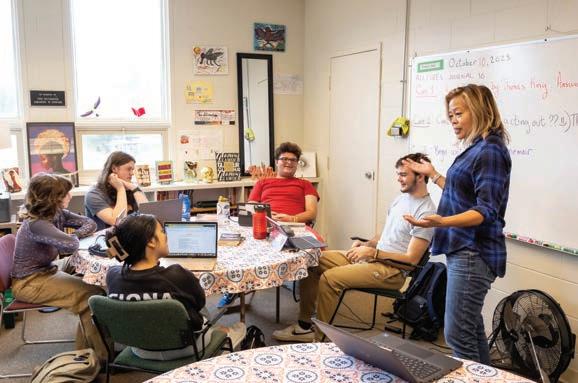
in GMT’s 50-year history,” said Clark.
Currently, the majority of GMT’s budget is paid for by local municipalities and the state. Shelburne, for example, contributed nearly $115,000 in the budget that passed on Town Meeting Day, a smaller contribution than other towns like Burlington, Winooski, Essex or Williston.
According to an assessment from GMT given to the selectboard last month, the ridership for bus route six which runs through Shelburne saw nearly 267,000 rides last year, a 8 percent increase over fiscal year 2022, and a 12 percent increase
A resolution signed by the selectboard last week, recommended by town manager Matt Lawless, who was present at GMT’s public meeting last week, asked legislators to consider two possible solutions to the lack of funding in this year’s transportation bill. Options outlined in the resolution include an increased rental car tax and vehicle registration fees. It is also possible that this will be focused on hybrid and electric vehicles, which collect less or no gas taxes.
Lawless, who bikes to work nearly every day, has made it a priority for Shelburne to show continued support of the service.
“On bad weather days, I bail out and hop on the bus,” he said. “I really appreciate how simple it is to have a convenient bus service.


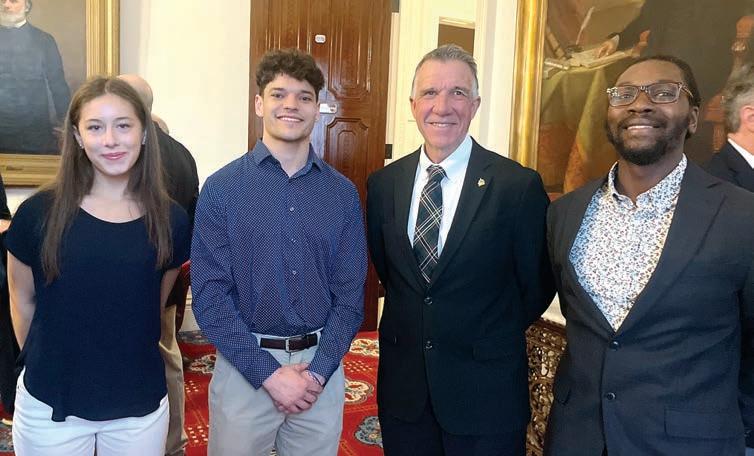
This week, Vermont youth met with Gov. Phil Scott to urge him to sign S.18 into law a bill to end the sale of flavored tobacco.
Juniper Galvani, 17, of South Burlington, Matt Meunier, student counselor at Champlain Valley Union High School, and Marcus Aloisi, 21, of Burlington, met with Scott March 27 to discuss the impact flavored tobacco has on youth in Vermont schools.
“It was great that we got to speak to the governor, and we want to thank him for hearing our perspective,” Aloisi and Galvani said. “For people who aren’t in the schools or spending time with kids, it can be hard to fully understand the huge impact that flavored tobacco and vapes are having. They are everywhere and most people our age are seriously addicted.”
Aloisi penned an opinion piece earlier this year, which read, in part: “I was in high school at South Burlington when I first used a vape. It was fruit-flavored and filled my lungs with toxic chemicals that I had no
idea about because, after all, we were told vapes were ‘safe’ ... The one thing that kept me coming back more than anything is that it tastes like candy. This was not the disgusting, makes-you-smell-bad substance that I was warned about.”
Galvani, in an earlier interview with Vermont Moms, said that the flavors of the tobacco products were what got her to try it, but the pervasive use of the products by most people her age in school is what kept her using the products, and keeps others using them.
S.18 would end the retail sale of all flavored e-cigarettes, e-liquids and oral nicotine pouches. The bill would also end the sale of all menthol-flavored tobacco products including cigarettes, cigars, pipe tobacco and smokeless tobacco.
The governor has raised concerns over the impact of the bill on small businesses.
The bill has passed the House and the Senate and was sent to the governor.
ed at least two weeks in advance. Send an e-mail to Jenna Reed or call 802-279-9058.






Boating safety education is required for any motorboat operator, 12 years of age or older, born after Jan. 1, 1974.
The Boat Vermont, eight-hour classroom course leads to certification. The course is offered over four days to a maximum of four people. Participants must be present at all classes to be eligible for certification. If full, contact 802-985-9551 to get on wait list.
Registration deadline is April 22. Session dates are Monday and Wednesday, April 29, and May 1, 6 and 8, 6-8:30 p.m. The fee is $10 with instructor Jon Fick, Vermont State Police building, 3294 St. George Road, Williston.
Reasonable accommodation is available on request at no cost to the student. Please include a description of the accommodation you will need. Individuals making such requests must include contact information. Requests should be made as early as possible; for example, an interpreter must be request-
Come play and connect with others. No pre-registration necessary, just sign in at the door. A parent or caregiver must be present at all times.
Scooters, bikes and ride-on toys are not permitted. There will be balls, hoops and tumbling mats. Wear indoor shoes or socks inside the gym. No food is allowed.
In case of inclement weather, call 802-985-9551 to check for cancellations.
The open gym for toddlers and preschoolers is held the second and last Sunday of the month through May, 9:30-11 a.m. The dates are April 14 and 28 and May 12 and 26.
A $5 suggested donation per family would be appreciated.
Volunteer coordinator is Aisha Mueller at Shelburne town gym.



Total reported incidents: 57
Traffic stops: 1
Warnings: 1
Arrests: 1
Medical emergencies: 18
Suspicious incidents: 12
Directed patrols: 2
Agency assists: 3
Citizen assists: 7
Motor vehicle complaints: 3
Car crash: 1
Animal problem: 2
Theft: 2
Harassment: 2
Trespassing: 1
Alarms: 4
False alarms: 2
Pending investigations: 4
March 25 at 2:29 p.m., Shawn Jerome, 51, of Shelburne, was arrested after a Walgreens employee told police he had assaulted them. Jerome was arrested on an outstanding warrant, escorted off the property and released.
March 25 at 5:28 p.m., police are investigating a retail theft incident at Kinney Drugs.
March 26 at 3:10 a.m., a caller from the Terraces told police an unknown person was knocking
on her door. Police investigated but could not find anyone.
March 27 at 8:47 a.m., a two-car crash was reported on Longmeadow and Shelburne roads with no injuries.
March 27 at 8:47 p.m., a man who was refusing to leave Harbor Place had to be escorted off the property by police.
March 28 at 7:13 p.m., fire and rescue responded to Shelburne Bay Senior Living where some folks were trapped in an elevator.
March 29 at 1:30 p.m., a caller from residence near Harbor Road told police they had been receiving harassing messages. Police are investigating.
March 29 at 1:33 p.m., a Winter Haven Road resident also told police they were receiving threatening messages.
March 30 at 7:29 p.m., police are investigating another retail theft from Kinney Drugs.
Note: Charges filed by police are subject to review by the Chittenden County State’s Attorney Office and can be amended or dropped.
The Vermont Supreme Court has suspended the law license of Addison County State’s Attorney Eva Vekos.
“We conclude that the evidence here warrants the immediate interim suspension of respondent’s license to practice law,” the unanimous ruling stated.
The decision, however, does not mean Vekos has to step down from her elected post.
John Campbell, executive director of the Vermont Department of State’s Attorneys and Sheriffs, said in an interview last week that a person does not need a law license to serve as state’s attorney.
But the duties that someone without a law license can do while a state’s attorney are fairly limited to administrative tasks since they cannot practice law, keeping them from taking part in court hearings or drafting court documents, according to Campbell.


Asked after the ruling was issued if Vekos intended to remain working as state’s attorney, David Sleigh, her attorney, replied, “That’s certainly been my understanding.”
The Supreme Court’s decision comes a week after the justices held a hearing on whether Vekos should be temporarily barred from practicing law for failing to provide information related to a medical leave she took following her arrest in January for driving under the influence.
“We note that this case is not about whether respondent’s medical records should be provided to Disciplinary Counsel,” the five-member court’s decision said. “The issue here is solely about whether (Vekos) responded to a lawful demand for information under (court rules). She did not.”
“Respondent’s behavior presents a substantial threat of harm to the public,” the opinion stated.
“Because she did not cooperate with Disciplinary Counsel, he ‘cannot determine if a disability investigation should be opened,’ and he ‘cannot assess how to protect the public.’”
A prosecutor for the state panel overseeing Vermont lawyers contended that Vekos’ failure to cooperate with an investigation into her leave warranted an “imme-
diate” suspension of her license to practice law.
Sleigh, Vekos’ attorney, countered that his client, who has since returned from the medical leave, should not have to provide the information since there have not been complaints nor evidence shown that she is not up to the job as the top prosecutor in Addison County.
Vekos went on paid medical leave Feb. 9 and returned to her post about three weeks later. The leave followed her arrest on the night of Jan. 25 on a drunken driving charge after she allegedly showed up impaired to the scene of a suspicious death investigation in Bridport.
Vekos refused to perform field sobriety tests or to take a breath test and would not agree to be photographed or fingerprinted once at the state police barracks in New Haven, where she was processed for the driving under the influence charge.
Vekos, in the days following her arrest, had an email exchange with law enforcement leaders in Addison County in which she stated she no longer felt safe around police and mocked their grammatical skills.
See VEKOS on page 7


As we are about two thirds of the way through the 2024 legislative session, I wanted to highlight and speak to the three topics I’ve been contacted about the most this year.
First, and most recently, I have received many concerns about the newly named Vermont education secretary, Zoie Saunders. I share the concern that she has not had any significant classroom or public-school experience and would be at the helm through momentous times for the future of our public education system. Though I am already inclined toward voting no on her confirmation — a unique power of the Senate — I am still trying to answer two questions.
Those in favor are generally schoolchildren, school administrators and pediatricians worried that harmful e-cigarettes, especially when laced, are becoming prevalent in schools.
I voted in favor of the bill, especially as it adds a position for online sales enforcement. The bill passed 18-12 and is on its way to the governor, who may or may not veto the bill.
Finally, S.258, which would add more voices to the Vermont Fish & Wildlife Board, led to likely the most polarized feedback we received. People were very strongly for or against this proposal, and that was originally mirrored in the Senate.
Finally, S.258, which would add more voices to the Vermont Fish & Wildlife Board, led to likely the most polarized feedback we received.
What powers would the secretary of education and the governor have to implement policy or budgetary changes without legislative approval? And what is the impact of a no vote on the secretary’s confirmation, besides the principled stance of a majority of the Senate?
The last time it is believed the Senate blocked a confirmation was during the Dean administration, so we will have to look at history, ensure a fair process and make a sound judgment based on the evidence.
Second, we have been receiving statewide communication on S.18, which bans the sale of menthol cigarettes and e-cigarette flavored cartridges. It does not ban pipes, shisha, pouches and other forms of flavored tobacco. Those opposed generally focused on lost revenue to local businesses, though other states have seen a dip in sales and then a return to the same level of tobacco sales.

That said, the bill was significantly amended and makes incremental change to diversify the Fish & Wildlife Board by two members, added to a current 14 and appointed by the House and Senate, as well as to vest rulemaking authority with the commissioner of the Department of Fish & Wildlife. The language on trapping was removed and the status quo remains.
This felt reasonable enough that the bill passed 21-8, and I voted yes on behalf of many constituents who would like to widen the circle of discussion beyond game fish and animals to all wildlife.
As always, I am happy to discuss any of these items further and it is a privilege to serve.
Kesha Ram Hinsdale, a Democrat from Shelburne, serves the towns of South Burlington, Shelburne, Charlotte, Hinesburg, Milton, Burlington, St. George, Westford, Underhill, Jericho, Richmond, Winooski, Williston, Essex and Bolton in the Legislature.


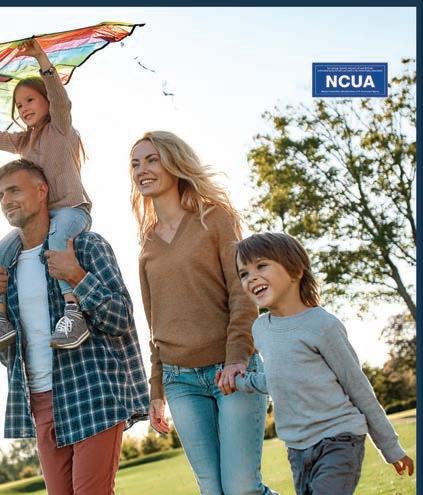









I recently completed an empowerment self-defense course, one specifically designed for women like me who have experienced physical or sexual assault. Initially, I felt skeptical. So much harm had been done to the core of who I am and to my sense of safety in this world, I figured it was too late for me. I couldn’t have been more wrong.
Turns out I’d been waiting my whole life for this course. There isn’t a part of me that wasn’t profoundly changed by the experience and the women who made it happen. Was it easy? No. Was it worth it? The biggest yes.
inside. This is not uncommon for many women, trauma survivors or not.

It was as if “no” had been erased from my vocabulary, not only because of the assaults, but through decades of conditioning. Women in our society, especially how I was raised, are instructed to be polite, kind and accommodating. We’re taught not to offend the offender, especially men, and, for many, this could mean our partners, bosses and co-workers. It’s either make nice or fear repercussions. This is not an exaggeration; there are real aggressions happening to women every day in what should be safe spaces.
Unexpectedly, my greatest challenge was learning how to use my voice to defuse a potential attack. At first, I couldn’t shout the word “no.” A lifetime of unsaid “nos” felt stuck deep
Consider the facts. One in five women in the U.S. are raped over the course of their lifetime. Fifty percent of women experience sexual assault other than rape. (These figures are considered under-representations.)
Look at the women in your
lives — mothers, daughters, sisters, wives, friends, colleagues — and know at least half, and likely more, have been assaulted. There’s more. Nearly 99 percent of the perpetrators are male. And 85 percent of these men were known to their victims.
These statistics are shocking, even though I know it for myself. I’m sorry we are in a world where women must learn how to fight off an attacker. But that is where we are. Before, I had no idea how to do it. I didn’t even know it was possible. After all, how could I defend myself from a man who is larger than me?
if necessary.
I learned that “no” is a complete sentence. I learned how to stop unwanted hugs or touching. I learned what to do if a man grabs me unaware. I learned personal space boundaries. I learned how to use my voice to possibly prevent an attack as most perpetrators fear getting caught or hurt. All this takes practice, just like everything else I want in my life.
I learned how to stop unwanted hugs or touching. I learned what to do if a man grabs me unaware. I learned personal space boundaries.
The amazing news is that this course taught me how to be less vulnerable to attack, proactively recognize aggressive behavior and deliver powerful strikes

I learned that my freeze response to danger is the same that many people experience. Moreover, it’s science. When our amygdala perceives an attack, the brainstem is signaled to inhibit movement, instantaneously, beyond conscious control. True for our voice as well. The brain’s Broca area, which is responsible for motor functions involved with speech and language, shuts down in a traumatic event. Now, although freeze may be my first response, I’ve learned it won’t be my last. I also got a rallying imperative


To the Editor: The Vermont Agency of Education, in “Roles and Responsibilities in Vermont School Systems,” delineates the purpose of school boards and writes that they engage “the community to establish the mission and vision for the district, and school boards are accountable to voters.”
This understanding was made abundantly clear to school board members and Champlain Valley School District administrators when its five towns voted overwhelmingly to defeat the first school budget on March 5. Since then, the school board has conducted three public meetings and one luncheon for legislators with a last virtual meeting on March 27.
At that meeting, the school board chose to present the same slides and material that they did on March 4, disappointing many of the 160 in attendance. Statements by board members like “we are focused on reducing the impact on the community, and the cost is simply too high for people to support, and this new budget
to listen to my gut. You know the one. We all have it, though we’re often trained to ignore it in order to appease. This gut feeling is my autonomic nervous system telling me something I want to hear. It was a gift to learn these many protective strategies. A boon of agency. The capability, authority and right to take care of myself. Where I had none, now I have a choice and options. This awareness and sense of self serves me in all areas of my life.
The Safety Team (thesafetyteam.org), a nonprofit organization right here in Vermont, delivered the innovative program I took. They also offer a variety of violence prevention and empowerment self-defense courses made for women by women.
My instructors provided powerfully supportive guidance and called us brave to take the class. For them, there are not enough thank yous. Moreover, they and the entire Safety Team are brave. As in courageous and intrepid. Great-hearted and heroic. Not just for heralding the right for us to be safe but teaching us how.
Carole Vasta Folley is an award-winning columnist and playwright. Visit carolevf.com for more info.
is reasonable,” would make one think they might get it.
But other statements like “this is not our budget, our budget failed, and we need the community to approve our spending,” offers hope that the board does understand that the way forward is with the help of the taxpayers. Better communication might be the key.
The school board has apparently chosen four to five voices to represent its viewpoint, but residents offered their own opinions and criticisms. Several residents spoke forcibly and passionately that the school board is targeting the wrong group of school district employees.
One resident said, “I’m very disappointed in the board for targeting all low-paying and student-facing positions and leaving the high-salary administrator positions untouched.”
Another said that “cutting low-paid positions and not cutting highly paid directors with no student time” is wrong, while another offered, “The lowest paid hard-working people with the
continued from page 4
She has since pleaded not guilty to the charge, which remains pending with the next hearing in the case set for May.
In announcing her medical leave last month, Vekos, through her attorney, Sleigh, stated she would be returning to work “once fully grounded and up to the task.”
In a press release stating she would be returning to her post earlier this month, Vekos said she had “deep regret” for comments in the earlier email exchange with local law enforcement leaders and would be meeting with them to help restore working relationships.
A petition was filed by Jon Alexander, disciplinary counsel for the Vermont Professional Responsibility Board, in late February seeking an “immediate Interim suspension” of Vekos’ law license. Alexander said Vekos had failed to cooperate with an investigation into her medical leave. That panel, which oversees allegations of misconduct of lawyers in the state, is part of Vermont’s judiciary.
without information related to the medical leave there were several unanswered questions, including whether the reasons for the medical leave had been resolved or were now under control.
Sleigh, in arguments during the hearing before the Vermont Supreme Court, said there has been no indication that Vekos has not been performing her duties as state’s attorney since her return from medical leave.
State’s Attorney Eva Vekos, charged with driving under the influence earlier this year, was accused of failing to cooperate with an investigation into a paid leave medical leave she took following her arrest.
“At this point,” Sleigh told the justices, “Mr. Alexander isn’t able to say that she’s exhibited any other psychiatric, psychological or medical disabilities in her continued practice as state’s attorney.”
Sleigh, speaking last week, called the decision “curious.”
“It’s a little unclear to me what it is that we failed to produce,” Sleigh said. “I emailed Jon Alexander (this morning) what it is he wants besides medical records that the Supreme Court said weren’t what was at issue and of course we’re awaiting his response.”
The decision, Sleigh said, does not specifically state what Vekos must do to have the suspension lifted.
“It kind of hints that she doesn’t have to directly provide her medical records without a formal legal ruling on whether those are subject to production,” he said. “We’ve reached out, as I said, to ask for a clear statement of what is being asked of us.”
A footnote to the ruling stated that the justices “encourage attorneys to take time away from practicing law” when it is needed as well as take advantage of services through the bar association.
“In this case, however, (Vekos) provided Disciplinary Counsel with no information about any issues that she might be experiencing,” the footnote stated.


Alexander wrote in a filing that
continued from page 6
most boots-on-the-ground should not be touched.”
Yet another resident questioned what the administrator-to-student ratio is, and the answer seemed elusive.
Another group of residents attacked the reason we find ourselves now in this position, saying, “We are funding education and not a bureaucracy, the number of positions at the Champlain Valley School District central office has grown from 15 to 37, and I thought we got together as a district in 2017 to save money, but now we’re spending even more.” Yet another resident saked, “Where’s my money going? and “will the budget ever go down?”
John Clifford HinesburgLawmakers thanked for environmentalism
To the Editor:
I am writing to express my gratitude for the Vermont Congressional delegation’s high
He added that while the justices stated in the ruling that the matter was not about whether Vekos’ medical records should be provided to Alexander, it doesn’t say what information should be provided to him.
“Absent cooperation from (Vekos),” the footnote added, “Disciplinary Counsel cannot assess the full scope of the circumstances involved, including whether a referral to a Bar Assistance Program might be appropriate.”
Vekos was elected to her first four-year term as Addison County state’s attorney in November 2022.

scores on the recently released League of Conservation Voters’ 2023 National Environmental Scorecard. The full Vermont federal delegation’s scores for 2023 are: Sen. Bernie Sanders (I), 94 percent (91 percent lifetime); Sen. Peter Welch (D), 100 percent (95 percent lifetime); and Rep. Becca Balint (D), 97 percent (97 percent lifetime).
As the youth member of the board of directors for Vermont Conservation Voters, I’m proud to have leaders that are committed to safeguarding democracy and protecting our environment both for my generation and those that will come after.
Despite a tumultuous national political landscape, Vermont’s delegation stands firm against proposals that would roll back environmental and democratic protections. As we saw with the catastrophic flooding that affected so many of our neighbors over the last year, the climate crisis is real, and it is here. Our delegation’s hard work to bring relief to our friends and neighbors last summer set an admirable example for all
of Congress, especially as partisan gridlock and discord continue to hamper progress on climate action.
I am proud to be represented by leaders who are dedicated to prioritizing environmental stewardship over partisan interests. By continuing to invest in renewable energy initiatives, promoting smart growth housing, safeguarding natural resources, and strengthening our resilience to climate change, we can create a sustainable future for generations to come.
As Vermonters, we’re good at coming together to solve problems that affect our communities. I have every confidence that we’ll do so now as the climate crisis continues to impact our brave little state. We can pave the way for a brighter, more sustainable, and more equitable future for all of us, and we’ll continue to have strong partners in that mission in Washington.
Matthew Vigneau South Burlington




When colonizers arrived in Sheet’ka (Sitka, Alaska), the homeland of the Tlingit people, they imported devastating infectious diseases. Russian and Euro-American colonizers’ writings describe these diseases as a marker of colonizers’ self-assumed superiority.
Colonizers saw vaccines as introducing a material part of European technology that would ultimately lead to Tlingit people’s acceptance of Russian and American colonial rule. In other words, they saw vaccines as inoculating Tlingit people with whiteness.
Dr. Adam Kersch presents the talk, “Inoculating Whiteness: Settler Colonialism, Whiteness and Infectious Diseases in Sheet’ka, Thursday, April 11, 6:30-8 p.m. on Zoom.
Research on this Vermont Abenaki Artist Association project involved archival analysis, interviews and participant observation, and this talk will discuss over 200 years of


colonial history and how colonizers used ideas about infectious diseases and vaccinations to justify attempted ethnocide.
It will also discuss how Tlingit leaders responded to other manifestations of whiteness during the COVID-19 pandemic.
Register in advance at https://bit.ly/3TFWQST.
Age Well and St. Catherine’s of Siena Parish in Shelburne are teaming up to provide a meal to go for anyone age 60 and older on Tuesday, April 9.
Meals will be available for pick up in the parking lot at 72 Church St. from 11 a.m. until noon and are available for anyone 60 or older. Suggested donation is $5.
The menu is chicken in gravy with mashed cauliflower, diced carrots, southern biscuit with butter, carrot cake with icing and milk.
To order a meal contact Kathleen at agewellstcath@gmail.com or 802-5031107. Deadline to order is Wednesday, April 3. If this is a first-time order, provide your name, address, phone number and date of birth.
More at agewellvt.org.
The Age Well meal pickup for Thursday, April 4, is from 10 to 11 a.m. at the Charlotte Senior Center features sweet and sour pork with vegetable sauce, brown rice with lentils and vegetables, green beans, wheat bread with butter, fruit crisp with cream and milk.
You must pre-register by the prior Monday at 802-425-6345 or meals@char-



lotteseniorcentervt.org.
The suggested donation is $5. Check the website for last-minute cancellations at bit. ly/3FfyLMb.
The meal for Thursday, April 11, features chicken in gravy with mashed cauliflower, diced carrots, southern biscuit with butter, carrot cake with icing and milk.
The meal for Thursday, April 18, features beef with barbecue sauce, baked beans, broccoli florets, wheat bun with butter, pumpkin craisin cookie and milk.
The St. Ambrose Knights of Columbus are hosting a Knights in Italy spaghetti dinner Friday, April 12, 5-7 p.m., at its parish in Bristol.
Meals are available to dine-in or takeout. All proceeds further the Knights’ mission of aiding the community in a variety of ways, including a donation of winter coats to local schools.
The menu includes spaghetti with sauce, garlic bread, salad and dessert. The cost of the meal is $12 for adults, $6 for children 12 and under, and $30 for a family.
No pre-order is necessary.
From birding to watercolors, April programs at senior center
For more details, go to charlotteseniorcentervt.org or call 802-425-6345.
• April artist exhibit
This month’s exhibit, “Found and Fiddled With” pretty much describes Jan Lawson’s style, themes, palette and materials. Many of her pieces reflect her emotions, ranging from the whimsical light-heartedness of snagging a mermaid and parading chickens to the despair of an earthquake, hunger and the horror of war.
She enjoys experimenting with the juxtaposition of colors and shapes in abstracts and collage. Most of her frames and surfaces are found at yard sales and resale shops. She paints over what she finds and fiddles with the various frames. Some dents, dings and scratches remain, lending patina and history.
• Veterans assistance, Tuesday, April 9, 10 a.m.- 2 p.m.
Join Bob Stock, veterans outreach specialist with the South Burlington Vet Center. He will be available to veterans and their families to ensure that they are aware of the benefits available to them and to assist with any Veterans Administartion issues that they may be experiencing.
• Alzheimer’s Caregivers Support Group, Wednesday, April 10, 4-5 p.m.
On Zoom or in-person. Monthly support group on the second Thursday of each month. Contact Susan Cartwright at cartwright.susan1@gmail.com.
• Men’s breakfast, Friday, April 12, 7 a.m.
Registration required by Tuesday for the
breakfast. Suggested donation: $6.
Men gather for breakfast and conversation. The speaker this month is Robert Caldwell, who will discuss Vermont’s 911 emergency response system. A member of Charlotte Fire and Rescue Services, he also currently serves as a dispatcher for the 911 system. In addition to discussing the EMS system he will also provide a refresher session on how to use the Senior Center’s automated external defibrillator. Attending?
Email Lane Morrison at lmorrison@gmavt. net before April 9.
• Kirtan, Friday, April 12, 5-6:30 p.m.,
Join Charlie Nardozzi and Heidi Kvasnak for a spring kirtan, heart-centered practices with ancient yogic chants or songs to create a feeling of connection to yourself and others. Suggested donation is $5 to $15.
• Birding expedition with Hank Kaestner, Wednesday, April 17, 9 a.m.
Join Kaestner, an avid bird watcher, and learn to identify various bird species and habitats in Vermont. Limited to 20 participants. Free, registration required.
• Play reading, Thursday, April 18, 1-3:30 p.m.
Join Sue Foley and Wally Gates for table-reading fun. No tryouts, no rehearsals, no critical reviews. The group meets monthly and is for people who enjoy reading plays aloud or listening to others perform. Contact Foley at ssnfoley@icloud.com.
• Plant sale planning meeting, Friday, April 19, 1 p.m.
Help plan the Friends of the Charlotte Senior Center’s annual plant sale. Sign up at the senior center or email Polly at ppolly62@ymail.com.
• Walking and gentle hiking group, Thursday, April 25, 9 a.m.
Registration required, free. Walk at a gentle pace with other seniors. Group meets each month for a congenial non-strenuous walk. Location to be determined. Meet at 9 a.m. in the parking lot of the center. Questions? Contact Penny Burman at 916-7537279.
• Red Cross blood drive, Thursday, April 25, 1-6 p.m.
At the Charlotte Senior Center. Visit redcrossblood.org for an appointment.
• “The Sky’s The Limit!” watercolor class with Ginny Joyner, Saturday, April 27, 10 a.m.-noon
If you’ve always wanted to try watercolor but were too intimidated, this is the class for you. Learn the properties of the blue shades and experience the Zen of watching paint dry. Each month, add to your repertoire of subject matter and learn new techniques. Registration required. Cost is $35, plus a $6 supply fee.
• Shape-note singing, Sunday, April 28, 12:30-2:30 p.m.,
Traditional a capella, four-part harmony sung for the joy of singing. Free, no registration required. Introduction to shape notes and scales is recommended and offered 30 minutes before each first Sunday singing. Contact Kerry Cullinan at kclynxvt@gmail. com to schedule.
Slow down for frogs and salamanders.
That’s the advice for drivers in early spring from state fish and wildlife officials.
“Slow down and be cautious when travelling at night in early spring or to take alternate routes to avoid driving roads near wetlands and ponds that salamanders and frogs cross during their breeding season,” Luke Groff, state fish and wildlife herpetologist, said.
Typically, in early spring, many of Vermont’s amphibians leave overwintering sites and migrate to the wetlands and ponds to breed and lay eggs. The timing of this annual event, termed Big Night(s), coincides with melting snowpack, thawing soils, relatively warm evening temperatures and rainfall.
Due to this year’s mild winter,
these conditions are expected to align and trigger spring amphibian migration, earlier than usual.
“One of the benefits of checking out amphibian road crossings,” Groff said, “is that you can see many individuals and species in a short period and small area, and some species may not be seen the rest of the year.”
The spotted and blue-spotted salamanders, for example, belong to a group called the mole salamanders because after breeding they retreat underground or under logs or stumps, and are rarely seen until the next spring.
Groff encourages Vermonters to explore the roads near their home and report amphibian road crossings to the Vermont Reptile and Amphibian Atlas (bit.ly/3vbV57I). If it is safe to take pictures of migrating amphibians, include them in your report, Groff said.
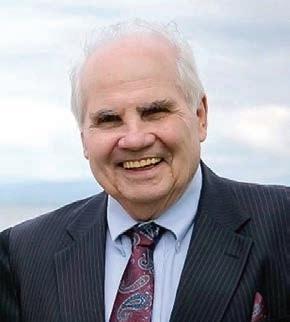
On Thursday, March 28, 2024, Robert J. Blow Sr. of Shelburne, beloved patriarch of the Blow family and its many branches, died peacefully surrounded by his loving family.
He is survived by his devoted wife, Patricia; his five children, Robert Jr. (Kim), Stacy, Teri (Michael), Dianna (Kevin) and Rebecca (Hoon); 10 beautiful grandchildren; 14 thriving great-grandchildren; and a mini schnauzer named EddyBob.
He is also survived by his younger brother, Michael (Donna); sister, Mary; sistersin-law, Donna (Joe), Ruthie and Susan; brother-in-law, Franklin; as well as several nieces and nephews.
He was predeceased by his


older brother, Thomas; sistersin-law, Betsy, Linda and Barbara; brothers-in-law, James, Ronald, Patrick, Billy and Dwayne; and son-in-law, Shawn.
Bob was born in the Bronx, N.Y., to Wilfred and Winifred O’Hara Blow.
He served in the Guard Reserve, owned the 7-Eleven store in Winooski, served on the Winooski Housing Authority, managed the Beverage Warehouse in Winooski and went on to be foreman of the SLC Quarry in Middlebury. After retiring from the quarry business, he took up guard duty at one of the loading docks at IBM in Essex Junction.
Bob was a loving family man, devoted to his wife of 64 years, as well as a cherished friend and mentor to many. His family is his legacy, and he loved every minute of his life. He will be missed by everyone he touched during his 87 years with us.
Bob’s family would like to thank the University of Vermont Medical Center hospice team for their care and guidance.
A Catholic Mass of celebration will be held at St. Catherine of Siena Church in Shelburne on Thursday, April 4, 2024, at 11 a.m. Interment will be at a later date at the Shelburne Village Cemetery. In lieu of flowers, please donate to the charity of your choice in Bob’s memory.


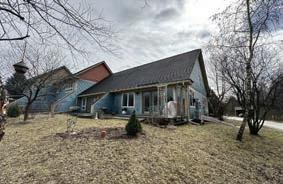



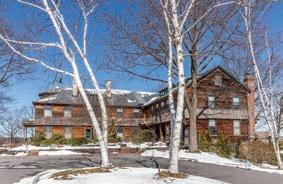







Michael Hibben, the executive director of the Pierson Library, has spent months prepping for the greatest celestial event to happen in Vermont in decades: the total solar eclipse.
Now, with the event just around the corner on Monday, April 8, Hibben and his partner in totality, Kit Luster, the town’s development review board coordinator and assistant zoning administrator, are prepping for what could be the most populated Shelburne has ever been at one time.
Since the Route 7 corridor is smack dab in the middle of the path of totality, some projections have indicated that more than 200,000 visitors could be elbowing their way through the Green Mountain State this weekend to catch a view of the once-in-a-lifetime celestial event.
While the team has facilitated two town-wide planning events in the past two months, with the big day just moments away, Hibben only has one remaining question: “Are you ready?”
If not, then you’re in luck. As most ticketed events in surrounding towns sell out, the town of Shelburne has prepped an unforgettable celestial and musical experience at the town’s athletic fields. To enhance the awe-inspiring moment as the moon aligns perfectly with the sun, Hibben has planned to have Pink Floyd’s
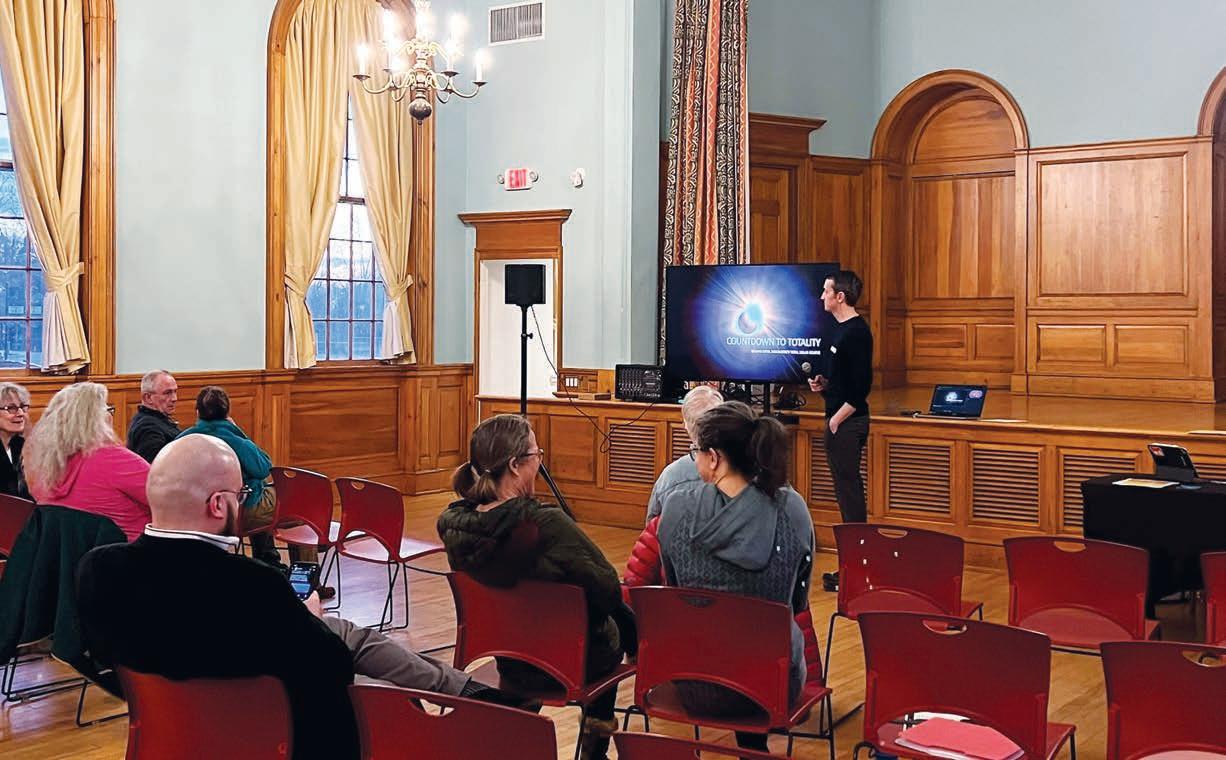
legendary album, “Dark Side of the Moon,” play in its entirety, creating a harmonious backdrop to the event.
Vendors from the Shelburne Farmers Market will be onsite
with food and wares for purchase.
“It’s a unique opportunity to come together as a community, appreciate the beauty of the cosmos, and let the music of Pink Floyd elevate this once-in-a-life-
time experience,” he said.
Eclipse glasses are also available at the Pierson Library while supplies last. The library will be closing early at noon on April 8.
Vermont Teddy Bear’s event, as all are getting out right about that same time, it’s just going to be a mass exodus.”










Police chief Mike Thomas and town constable Bob Lake are also encouraging residents to walk, bike and carpool as much as possible that day as parking will be extremely limited. Harbor Road, eastbound from Shelburne Farms, will also be closed from 9 a.m. until 6 p.m.
“We’re doing that for pedestrian safety and to limit the access to Shelburne Road in the village,” Thomas said, adding that patience will be key for residents who aren’t used to bumper-to-bumper traffic.
“We’re trying to limit the egress from the town event, the museum’s event, Shelburne vineyards,
Aside from a few ticketed events happening in town that day, Shelburne has designated four official eclipse viewing sites for visitors looking for a place to watch the eclipse. The town plans to have volunteers at each of the sites with eclipse information and free glasses:
• Shelburne Parade Ground, Church Street.
• Davis Park, 344 Harbor Road, limited parking.
• Shelburne Bay Park, 1230 Bay Road, limited parking.
• LaPlatte Nature Park, 233 LaPlatte Circle, limited parking.

The Shelburne Players spring 2024 production, “Kodachrome,” features 15 local actors, including several from Shelburne.
“Kodachrome” will be presented in six shows over two weekends in the historic Shelburne Town Hall, 5372 Shelburne Road.
The play welcomes you to Colchester, a small town where everybody knows each other, and the pace of life allows the pursuit of love to take up as much space as it needs. The tour guide is Suzanne, the town photographer, who peeks into her neighbors’ lives to catch glimpses of romance in all its stages of development. “Kodachrome” is a play about love, nostalgia, the seasons and how we learn to say goodbye.
“Tender and poignant and awkward and funny all at the same time — you know, just like life,” says Broadway World.
Shelburne actors include Karlie Kauffeld (florist), Elizabeth Bates (mystery novelist), Kendra Culley (EMT) and Emilly LaFleur (Marjory). Alex Nalbach is the show’s director.
This is LaFleur’s debut with Shelburne Players as Marjory. She is a legal advocate for survivors of domestic violence by day and lives in town with her
partner, Alek.
Bates grew up in Bennington, studied theater in college, acted years ago with Oldcastle Theatre Co. and has done work as an extra in film and television. This is Elizabeth’s third performance with The Players.
Kauffeld, working on her fourth show, spent the last ten years as the kindergarten to eighth grade music and theater educator at Folsom School in South Hero. She is now on the puppeteering team for Puppets in Education through the Vermont Family Network, where she travels to schools around Vermont and beyond performing shows on bullying, sexual abuse, anxiety and more.
Culley returns to the stage in her second production with The Players. She received her Bachelor of Fine Arts from Mason Gross at Rutgers University where she studied, performed and taught at Shakespeare’s Globe Theater in London.
Show dates and times: Friday, April 5, at 7 p.m.; Saturday, April 6, at 7 p.m.; Sunday, April 7 at 2 p.m.; Friday, April 12, at 7 p.m.; and Saturday, April 13, at 2 and 7 p.m.
For tickets and more information, visit shelburneplayers.com.
vermont gatherings present:

Explore over 65 artisans and vendors selling handmade gifts, clothing, woodcrafts, jewelry, mead, wine, and more.
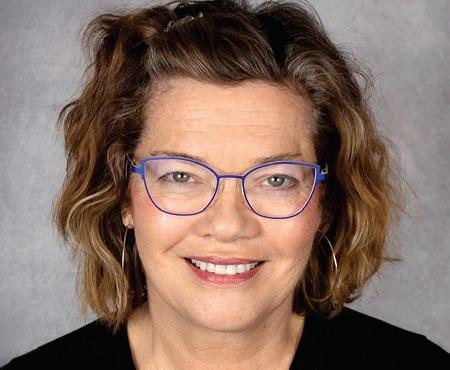

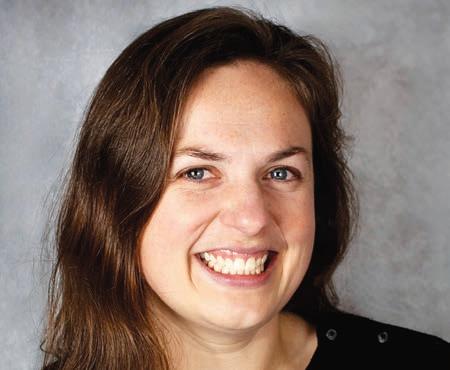
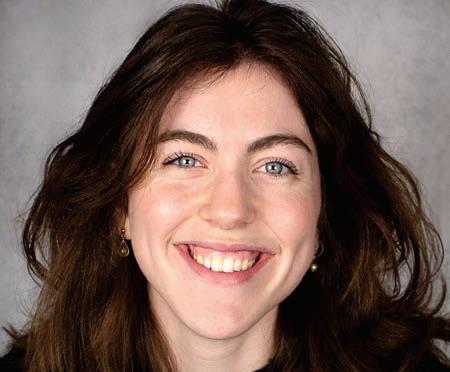




Our patients are so important to us. From the minute they walk through the door we want them to have the best experience possible, and that starts with you!
The right candidate has great customer services skills. Duties include patient scheduling, billing, reports. If you have the personality we’re looking for, we’re willing to train. Four-day work week!
Sound like you? (802) 985-2210 Call today!

continued from page 1
with Champlain Housing Trust to find a home on St. Paul Street in Burlington that could accommodate the individuals living there.
But the building was less than suitable for the needs of the residents and 24-hour support staff, she said.
“It’s a two-story building, it’s kind of broken up because it formerly was an apartment building, but it was better than what we had at the time, which was nothing,” she said. “So, we moved folks in there, and we’ve been there ever since. But going up and down the stairs is really hard. It’s hard to run a program like this there because we cook for people, we do people’s laundry.”
en and pantry, a living and dining room space, library, exercise room, laundry units and bathrooms.
“Every room has a closet, which in the current place, nobody has a closet. They just have these plastic shelves,” she said.
“Sixteen people with chronic and persistent mental illness who usually don’t get nice
things are getting this brand new, beautiful building and an unbelievable welcome from the Shelburne community.”
— Cathie Buscaglia Shop local and please remember our advertisers!
The new one-story building, which sits on 1.15 acres directly next to the Dutch Mill Diner, includes 16 individual bedrooms with closet space, a brand-new industrial-sized kitch-
Shelburne’s Equity & Diversity Committee
will hold a special meeting at the Inn at Shelburne Farms on April 6th from 12-4 for the purpose of strategic planning.
Agendas and minutes will be available at shelburnevt.org. Rental Office
Buscaglia explained that folks have been quick to donate brand-new furniture, equipment for the exercise room and other amenities that make this new building a full upgrade from where residents are now living.
“Just to see the faces of our residents and our staff when they come here and they’re like, ‘Oh my gosh, we get to live here?’ or “We get to work here?’ I mean, it’s just really fulfilling,” she said.
Aside from the welcoming aesthetics of the bright walls and open hallways, Buscaglia said that the Shelburne community has greeted this project with open arms since the beginning, something that hasn’t always been the case with projects of this nature.
She noted, for example, that the building’s new neighbor, Michael Bissonette, owner of the Dutch Mill Diner, also donated 16 gift cards for each of the residents for a free breakfast or lunch.
“He called me last week and was like, ‘Cathie, I want to give 16 gift cards for the residents to come for free breakfast or lunch,’” she said. “So tomorrow when they move in, they’re going to have a gift card from the Dutch Mill. It just gives me goosebumps.”
For Buscaglia, who has been spearheading projects of this nature with the Howard Center for the past 30 years, this specific project has become a sort of passion project, especially since this project is not meant to be transitional housing — these residents have lived together for years —so creating a space that truly feels like home was her deepest concern.
There is some anxiety as residents prep for the move, she said, but support from the Shelburne community in recent months has been paramount.
“Sixteen people with chronic and persistent mental illness who usually don’t get nice things are getting this brand new, beautiful building and an unbelievable welcome from the Shelburne community,” she said.
continued from page 1
thing that is connected to people — those positions and programs all are staffed by people.”
As the second budget vote looms, anxiety and uneasiness among the district staff is high. Drastic cuts have already been proposed for the newest budget after the first budget failed on town meeting day by more than 1,500 votes.
Some 42 full-time positions would be cut under the newest $101.8 million budget, including seven central administration positions, 15 student support paraprofessional positions, and three paraprofessional interventionist positions that were previously funded by federal grants.
Nearly 15 teaching positions will be cut throughout the five schools. At the high school, cuts will result in reduced classes and support in music, theater, French, Latin, business, library services and other programs.
“Hearing about the failure of the budget felt like a gut punch,” McLean said. “After having gotten through Covid together, feeling like we’re standing back on our feet ... it just feels as though now we’re taking two steps backwards after finally moving with some forward motion.”
If this budget fails, district administrators and school board members will have to go back to the drawing board. District officials have said a third budget may need an additional $500,000 cut, which would likely translate into more cuts to faculty.
“When we get to that point,
within that $500,000, there will likely have to be structural change either within the district or at campus level,” Superintendent Rene Sanchez has said. “We would have to find different ways to be able to serve the kids at the same level without positions that could be paraprofessionals or teachers or even administrators.”
In the run up to April 16, dozens of teachers, staff members and board members have been out with signs urging the public to vote yes. School board members like Meghan Metzler and Cassandra Townshend have been out as well.
“I’ve asked board members to be at as many of them as they can,” Metzler said, adding that the school board was not coordinating the events but was in support of it.
Other board members like Keith Roberts have been posting budget information to online sites like Facebook to get people out to vote.
“My hope is that the focus remains on the forest here — that is supporting our schools, our faculty and staff, and our students by passing the budget now presented for a vote on April 16 that allows us to continue to provide a high-quality education to them,” Roberts said in a social media post.
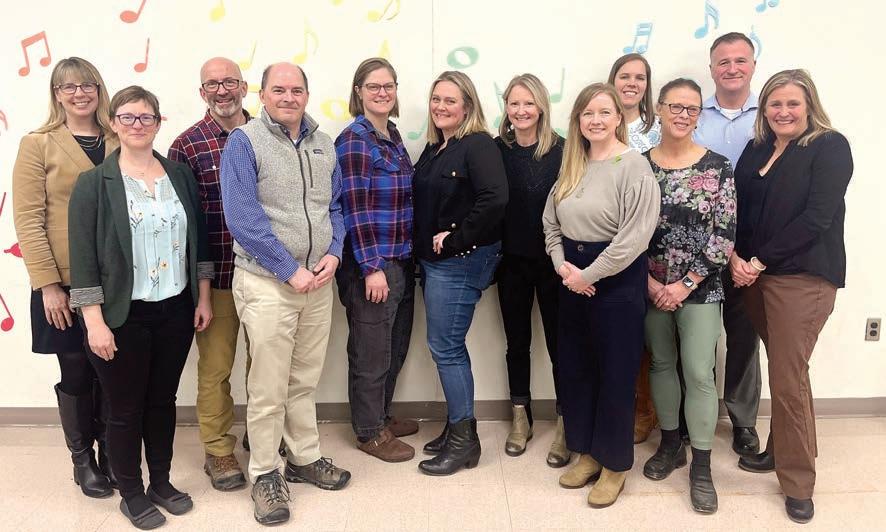
More than a year and a half of work to craft a budget under Act 127 was tossed out of the window earlier this year when the Legislature decided to scrap a key part of the state’s education finance law and passed H.850, which changed an already complex formula.
The school district was considered one of the most disadvantaged school districts in the state under the formula. District officials had estimated a roughly 18 percent increase for member towns under that formula.
After H.850 passed, district
“Of course, if that budget is not approved, we will return to the task of proposing one that will get approved,” he added. “I cannot indicate for certain what that would look like, but it is certain that it would reflect further reductions in expenditures which would have to come from further reductions in positions.”
continued from page 2 saliva. ways fatal treatment 100 percent a person
officials opted not to make any changes and move forward with the budget they had warned prior to the law change. But that was ultimately voted down, with just over 5,000 votes cast against budget and 3,391 votes in favor on Town Meeting Day.
Many residents cited the dramatic tax hikes associated with the last budget. Under the current budget, Charlotte would see a 17
it “was important to work together with the employees, the administration, and the district to work in solidarity to let people know that the budget revote is happening and then to also encourage people to vote.”
There’s plenty of anxiety among teachers and staff in the schools, and a second budget failure would only further that anxiety.
Rabies is a deadly viral disease of the brain that infects mammals. It is most often seen in raccoons, skunks, foxes, and bats, but unvaccinated pets and livestock can also get rabies.The virus is spread through the bite of an infected animal or contact with its


So far have tested those have According animals mal behavior, an animal it. People animals































